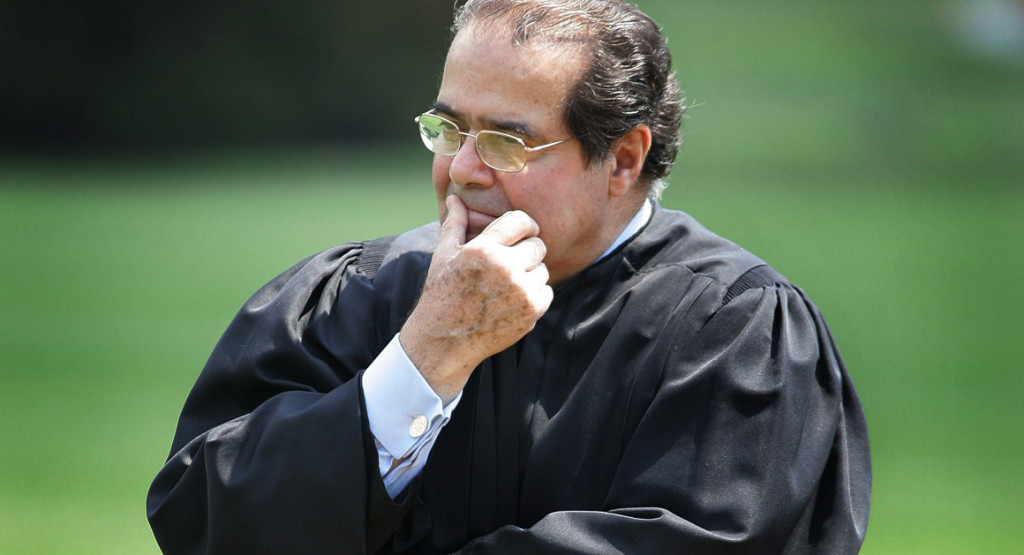FEBRUARY 13, 2016
Photo: Getty
Supreme Court Justice Antonin Scalia, 79, a strict Constitutionalist who was considered by many to be the most conservative member of the sitting Court, was found dead on Saturday afternoon at a West Texas hunting resort.
Scalia, the longest-serving justice on the current Court, was by far the most outspoken member on that bench, writing eloquent findings in support of and blistering dissents in opposition to majority Court rulings.
A Roman Catholic, said by many to be extremely devout, Scalia’s views were fashioned both by his religion and his being an “originalist,” meaning that he determines his rulings on whether he believes the Founding Fathers intended to include those rights in question in the Constitution, a viewpoint that is shared by some, but not many, legal scholars.
Scalia was also known for outrageously controversial statements, particularly in the areas of gay rights and affirmative action. He has famously compared homosexuality to “adult incest and beastiality,” and likened gay sex to “flagpole sitting.” (Take a moment to picture that.) And just this December, Scalia suggested that African-American students may benefit from the ending of all affirmative action admission policies because many are “pushed ahead too fast” and that they might be better off getting into “lesser schools” instead.
Such despicable views aside, Scalia’s legacy on the Court is sure to be discussed in coming weeks and months by legal scholars, of which I am definitely not one.
What I am interested in is how his passing will effect this term of the Supreme Court and how this will alter (and, believe me, it will) the politics of the 2016 Presidential campaign.
First the Court. The Court is halfway through its term, and, except for the day off to attend Justice Scalia’s funeral, members of the Court will continue to hear and rule on cases with the 8 surviving members. This, of course, means that there is the prospect on any case of a 4-4 tie. What happens then? If in coming cases, there is no replacement justice yet approved and there is a tie vote, there is officially no Supreme Court ruling, and the verdict of the lower court that is being appealed will stand.
In addition, if a vote has already been taken on a case but has not yet been made public (and none in this term have), Scalia’s vote will not count. (A justice still has to be be a member of the Court when the vote is announced for the ruling to apply.) So if the a case has prevailed by a 5-4 margin, the official vote will now be counted 4-4 when the decision is announced in June, so instead of a conservative (or progressive) victory, the case will be considered a “no-ruling,” and the lower court ruling will count. This will have a profound effect on upcoming cases involving abortion, campaign finance reform, and President Obama’s executive order on immigration.
Those who were joyously hoping that Obama would have the chance to appoint one more justice to the Court should leave the champagne in the fridge, though, because there is no way in hell that the makeup of this Senate will allow a pick by this President to get through, especially when, as the GOP believes, there is a very good chance that a Republican will succeed Obama next January. In that case, if the GOP holds onto the Senate, the new Republican President could nominate someone like Ted Cruz to the Supreme Court, and he’d sail through the confirmation process, and we’d be stuck with him for the rest of our lives.
The six remaining Republican candidates are very well aware of that as they prepare for Saturday night’s debate. [I’ll tackle the play-by-play of that tussle in tomorrow’s column.] Within an hour of the death of Justice Scalia, whose body wasn’t even cold yet, Cruz rushed to the microphones to announce his litmus test for potential replacements. In addition, several GOP leaders have already suggested that, as Obama’s term is coming to an end, the President step away and allow the next Chief Executive to make an appointment. Knowing Obama, fat chance of that happening.
I think it’s undeniable, though, that we’ve got potentially a very ugly nine months ahead of us.
There is still one lingering mystery.
With Scalia gone, who’s going to tell Clarence Thomas how to vote?












